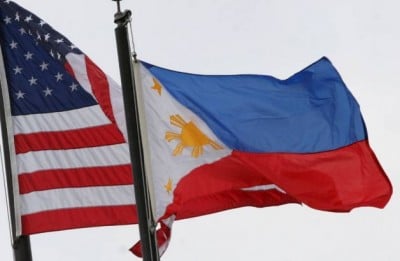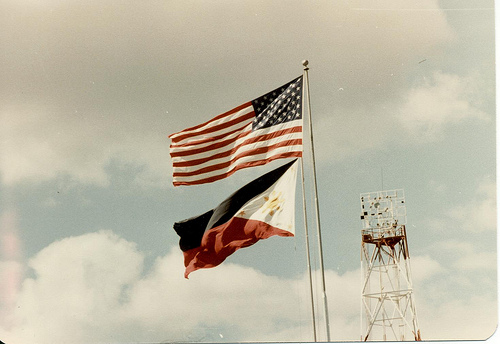“Operation Enduring Freedom-Philippines”: The U.S. Aids and Abets War Crimes in the Philippines

After Sept. 11, 2001, President George W. Bush declared the Philippines a second front in the war on terror (“Operation Enduring Freedom-Philippines”). The Philippine government used this as an opportunity to escalate its war against Muslim separatists and other individuals and organizations opposing the policies of the government. The egregious human rights violations committed by the Philippine military and paramilitary forces are some of the most underreported atrocities in the media today.
The International Peoples’ Tribunal on Crimes Against the Filipino People, held July 16-18 in Washington, D.C., drew upward of 300 people. An international panel of seven jurors heard two days of testimony from 32 witnesses, many of whom had been tortured, arbitrarily detained and forcibly evicted from their land. Some testified to being present when their loved ones, including children, were gunned down by the Philippine military or paramilitary. I testified as an expert witness on international human rights violations in the Philippines, many of which were aided and abetted by the U.S. government.
Thirty-one-year-old Melissa Roxas was a community health adviser who went to the Philippines in 2009 to conduct health surveys in central Luzon, where people were dying from cholera and diarrhea. In May of that year, 15 men in civilian clothes with high-powered rifles and wearing bonnets and ski masks forced her into a van and handcuffed and blindfolded her. They beat her, suffocated her and used other forms of torture on her until releasing her six days later. Roxas was continually interrogated and even threatened with death during her horrific torture. She was likely released because she is a U.S. citizen (she has dual citizenship).
But WikiLeaks revealed that although the U.S. Embassy was aware of Roxas’ torture and abduction, it did nothing to secure her release. Roxas convinced the Philippines Court of Appeals to grant her petition for writ of amparo, which confirmed she had been abducted and tortured. Nevertheless, the Philippine government refuses to mount an investigation into her ordeal. And although she lives in the United States, Roxas remains under surveillance.
“Whenever you work with communities,” Roxas testified, “[the Philippine government] vilifies you as a member of the New Peoples Army [NPA].” Ironically, the Philippine military claimed it was the NPA, the armed wing of the Philippine Communist Party, that abducted Roxas. Her physical and emotional scars remain. But, Roxas told the tribunal, “I have the privilege of being in the United States,” unlike many other Filipino victims of human rights violations.
People and groups have been labeled “terrorists” by the Philippine government, the U.S. government and other countries at the behest of the U.S. government. The Philippine government engages in “red tagging”—political vilification. Targets are frequently human rights activists and advocates, political opponents, community organizers or groups struggling for national liberation. Those targeted for assassination are placed on the “order of battle” list.
The tribunal documented 262 cases of extrajudicial killings, 27 cases of forced disappearances, 125 cases of torture, 1,016 cases of illegal arrest, and 60,155 incidents of forced evacuation—many to make way for extraction by mining companies—from July 2010 to June 30 of this year by Philippine police, military, paramilitary or other state agents operating within the chain of command.
As part of the U.S. war on terror, in 2002 the Gloria Macapagal-Arroyo government created the Oplan Bantay Laya, a counterinsurgency program modeled on U.S. strategies, ostensibly to fight communist guerrillas. After 9/11, the Bush administration gave Arroyo $100 million to fund the campaign in the Philippines.
The government of Benigno Aquino III continued the program in 2011 under the name Oplan Bayanihan. It does not distinguish between civilians and combatants, which is considered a war crime under the Rome Statute and the Geneva Conventions.
Oplan Bayanihan has led to tremendous repression, including large numbers of extrajudicial killings, forced disappearances, torture and cruel treatment. Many civilians, including children, have been killed. Hundreds of members of progressive organizations were murdered by Philippine military and paramilitary death squads. Communities and leaders opposed to large-scale and invasive mining have been targeted. Even ordinary people with no political affiliation have not escaped the government’s campaign of terror.
One witness testified that although the counterinsurgency program was presented in the guise of “peace and development,” it was really an “operational guide to crush any resistance by those who work for social justice and support the poor and oppressed.”
Philippine military and paramilitary forces apparently rationalize their harsh treatment as necessary to maintain national security against people and organizations that seek to challenge, or even overthrow, the government. However, the Convention Against Torture and Other Cruel, Inhuman or Degrading Treatment or Punishment (CAT) says, “No exceptional circumstances whatsoever, whether a state of war or a threat of war, internal political instability or any other public emergency, may be invoked as justification for torture.” Both the Philippines and the United States are parties to the convention on torture.
A 14-year-old boy testified that as he was walking with family members to harvest their crops, “We were fired upon” by soldiers. “We said, ‘We are children, sir.’ ” But the soldiers killed his 8-year-old brother. “I embraced him. The soldier said we were enemies. He was bleeding, the bullet exited in the back. He was dead when my mother saw him. We made an affidavit against the soldiers but it was dismissed by the prosecutor.”
Raymond Manalo was an eyewitness to kidnapping, torture, rape and forced disappearances. He testified that he saw civilians burned alive by soldiers and paramilitary forces. Two women were hit with wooden sticks and burned with a cigarette. Sticks were inserted into their genitals. The two women disappeared and have not been seen since. Although a case was filed, there has been no resolution.
Cynthia Jaramillo testified that her husband, Arnold, was one of nine unarmed men killed in a massive military operation that lasted almost a month. Although Arnold was a member of the NPA, “They were not killed during a legitimate running battle,” she said. “The state of their bodies when recovered clearly indicated the torture, willful killing and desecration of the remains.” Arnold was taken alive and killed at close range by multiple gunshot wounds, his internal organs lacerated, his jaws and teeth shattered. This violates the Geneva Conventions and constitutes illegal extrajudicial killing off the battlefield.
Continuing the Bush policy of the pivot to Asia-Pacific, as a counterweight to China, President Barack Obama enlisted the Aquino government last year to negotiate the Enhanced Defense Cooperation Agreement. While paying lip service to the Philippines’ maintaining sovereignty over the military bases in their country, it actually grants tremendous powers to U.S. forces. The United States also wants to return to its two former military bases at Subic Bay and Clark, which it left in 1992. Those bases were critical to the U.S. imperial war in Vietnam. A U.S. return would violate the well-established right of peoples to self-determination enshrined in the International Covenant on Civil and Political Rights (ICCPR).
The Rome Statute of the International Criminal Court (ICC) includes a prohibition on aiding and abetting liability for war crimes. An individual can be convicted of a war crime in the ICC if he or she “aids, abets or otherwise assists” in the commission or attempted commission of the crime. This includes “providing the means for its commission.”
Between 2001 and 2010, the U.S. government furnished more than $507 million in military aid to the Philippine government, enabling it to commit war crimes. U.S. political and military leaders could be liable in the ICC for war crimes as aiders and abettors.
The United States planned and helped carry out the botched Mamasapano raid on January 25, 2015. Dozens died when commandos from the Special Action Force of the Philippine National Police entered Mamasapano, where the separatist Moro Islamic Liberation Front had a stronghold. The Obama administration had put a $5 million bounty on terror suspect Marwan’s head. According to the Philippine Daily Inquirer, US drones identified Marwan’s hiding place, led the commandos to it, and provided real-time management capacity for the operation off the battlefield. Marwan was killed but his finger was severed and disappeared. It then appeared at an FBI lab in the United States a few days later. DNA tests on the finger confirmed it was Marwan who had been killed.
Murder, torture and cruel treatment constitute war crimes under the Rome Statute and the Geneva Conventions. Both the United States and the Philippines are parties to the Geneva Conventions. But although the Philippines is a party to the Rome Statute, the United States is not. In fact, the U.S. government offered the Philippine government $30 million in additional military aid to secure an agreement that U.S. soldiers in the Philippines would not be turned over to the ICC.
The jury in the tribunal found defendant Aquino and defendant Government of the United States of America, represented by Obama guilty of war crimes and crimes against humanity. “Indeed,” the panel wrote, “the Prosecution has satisfied the burden of proving satisfactorily that the Defendants, in concert with each other, willfully and feloniously committed gross and systematic violations of Filipino people’s basic human rights.”

The jurors decided, “The killings and disappearances follow a pattern. The victims are vilified as members of the Communist Party of the Philippines, and subjected to red tagging … after vilification, the victims are subjected to surveillance and then later killed or abducted.” The panel noted, “These are not random vi
olations.” They are “not isolated but state-sponsored, part of a policy deliberately adopted to silence the critics of the government.” They called it “state terror,” drawing an analogy with the military and authoritarian regimes in Latin America in the 1970s and ’80s, which were also supported by the United States.
“Terrorist tagging,” according to the jurors, is not just intended to define military targets but also to “sabotage the peace process between the National Democratic Front (NDF) and the Philippine government.” In fact, Jose Maria Sison, the NDF’s chief political consultant, has been classified by the United States as
a “person supporting terrorism.” Sison’s assets have been frozen and he is forbidden to travel, in violation of the ICCPR. The European Union’s second-highest court ruled to delist Sison as a “person supporting terrorism” and reversed a decision by member governments to freeze assets. Yet he remains on the U.S. terrorism list.
Moreover, the jury determined, “the failure of the Philippine government through Defendant Aquino to identify, investigate and/or prosecute the perpetrators of these violations is among the contributing factors to the prevailing impunity in the Philippines.”
The jury urged the defendants to undertake “proper remedial measures to prevent the commission or continuance of such illegal and criminal acts, to repair the damages done to the Filipino people and their environment, compensate the victims and their families for their atrocities, and to rehabilitate the communities, especially indigenous communities that have been destroyed by the criminal acts of the Defendants.”
The panel concluded, “We also encourage the peoples of the world to seek redress, to pursue justice [under universal jurisdiction], and to transform this oppressive, exploitative and repressive global state of affairs exemplified by the experience and plight of the Filipino people, to challenge the international ‘rule of law,’ and to construct a global order founded on full respect for the rights of all peoples, everywhere.”
This article was originally published on Truthdig (www.truthdig.com).

